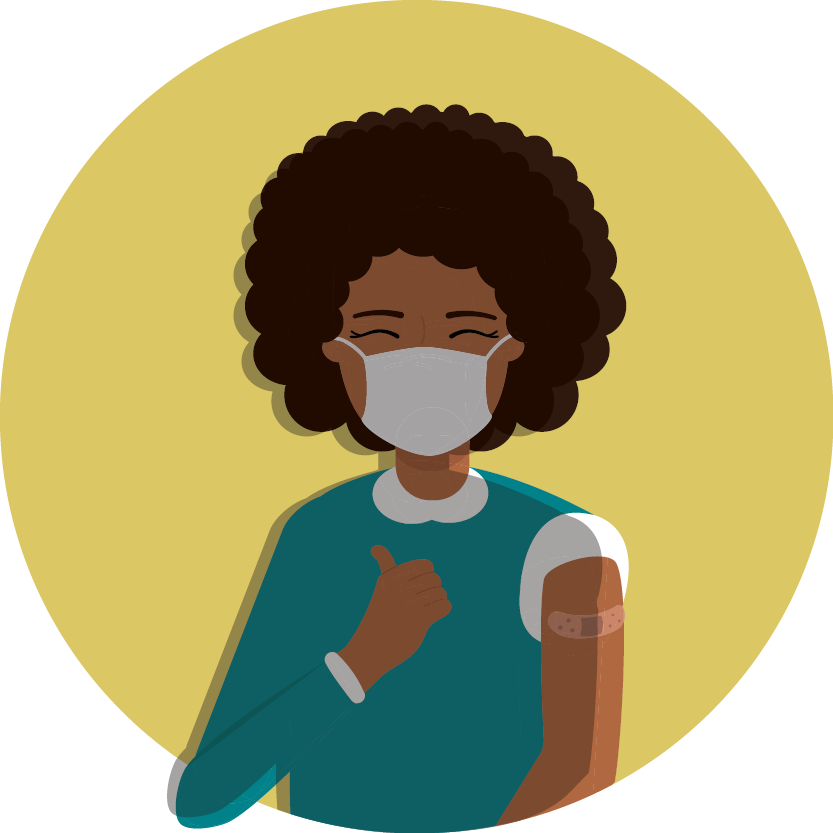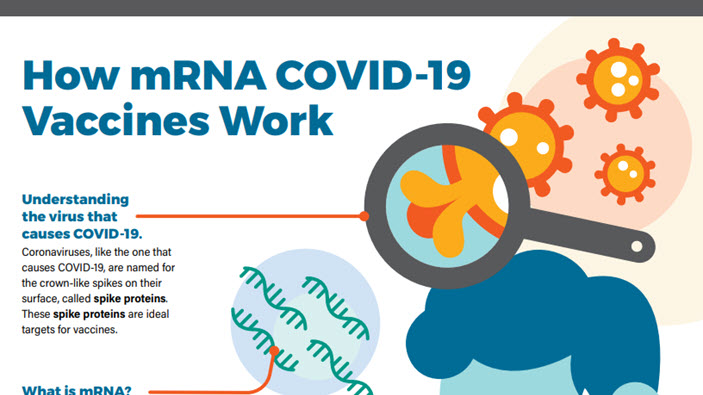 |
|---|
หน้าหลัก | สุขภาพดี | สุภาพสตรี | การแปลผลเลือด | โรคต่างๆ | วัคซีน
Understanding mRNA COVID-19 Vaccines
What You Need to Know
Messenger RNA vaccines—also called mRNA vaccines—are some of the first COVID-19 vaccines authorized for use in the United States.
New Approach to Vaccines
mRNA vaccines are a new type of vaccine to protect against infectious diseases. To trigger an immune response, many vaccines put a weakened or inactivated germ into our bodies. Not mRNA vaccines. Instead, they teach our cells how to make a protein—or even just a piece of a protein—that triggers an immune response inside our bodies. That immune response, which produces antibodies, is what protects us from getting infected if the real virus enters our bodies.
A Closer Look at How COVID-19 mRNA Vaccines Work

COVID-19 mRNA vaccines give instructions for our cells to make a harmless piece of what is called the “spike protein.” The spike protein is found on the surface of the virus that causes COVID-19.
Facts about COVID-19 mRNA Vaccines
They cannot give someone COVID-19.
They do not affect or interact with our DNA in any way.
COVID-19 mRNA Vaccines Will Be Rigorously Evaluated for Safety
mRNA vaccines are safe and effective.
mRNA vaccines have been held to the same rigorous safety and effectiveness standards [332 KB, 24 pages]external icon as all other types of vaccines in the United States. The only COVID-19 vaccines the Food and Drug Administration (FDA) will make available for use in the United States (by approval or emergency use authorization) are those that meet these standards.
mRNA Vaccines Are New, But Not Unknown
Researchers have been studying and working with mRNA vaccines for decades. Interest has grown in these vaccines because they can be developed in a laboratory using readily available materials. This means the process can be standardized and scaled up, making vaccine development faster than traditional methods of making vaccines.
mRNA vaccines have been studied before for flu, Zika, rabies, and cytomegalovirus (CMV). As soon as the necessary information about the virus that causes COVID-19 was available, scientists began designing the mRNA instructions for cells to build the unique spike protein into an mRNA vaccine.
Future mRNA vaccine technology may allow for one vaccine to provide protection for multiple diseases, thus decreasing the number of shots needed for protection against common vaccine-preventable diseases.
Beyond vaccines, cancer research has used mRNA to trigger the immune system to target specific cancer cells.
Learn more about getting your vaccine.
For Healthcare Professionals
More Information
Myocarditis and Pericarditis After mRNA COVID-19 Vaccination
CDC and its partners are actively monitoring reports of myocarditis and pericarditis after COVID-19 vaccination. Active monitoring includes reviewing data and medical records and evaluating the relationship to COVID-19 vaccination.
Myocarditis is inflammation of the heart muscle, and pericarditis is inflammation of the outer lining of the heart. In both cases, the body’s immune system causes inflammation in response to an infection or some other trigger. Learn more about myocarditis and pericarditis.external icon Seek medical care if you or your child have symptoms of these conditions within a week after COVID-19 vaccination.
What You Need to Know
Both myocarditis and pericarditis have the following symptoms:
Seek medical care if you or your child have any of these symptoms, especially if it’s within a week after COVID-19 vaccination.
If you have any health problems after vaccination, report them to VAERSexternal icon.
Healthcare Providers: For additional recommendations and clinical guidance, visit Clinical Considerations: Myocarditis after mRNA COVID-19 Vaccines | CDC
Should I Still Get Myself or My Child Vaccinated?
Yes. CDC continues to recommend that everyone aged 12 years and older get vaccinated for COVID-19. The known risks of COVID-19 illness and its related, possibly severe complications, such as long-term health problems, hospitalization, and even death, far outweigh the potential risks of having a rare adverse reaction to vaccination, including the possible risk of myocarditis or pericarditis.
If you or your child has already gotten the first dose of the Pfizer-BioNTech or Moderna vaccine, it’s important to get the second dose unless a vaccination provider or your doctor tells you not to get it.
If you have concerns about COVID-19 vaccination, talk with your or your child’s doctor, nurse, or clinic.

